对话填空练习 答案
情景交际填空题及答案
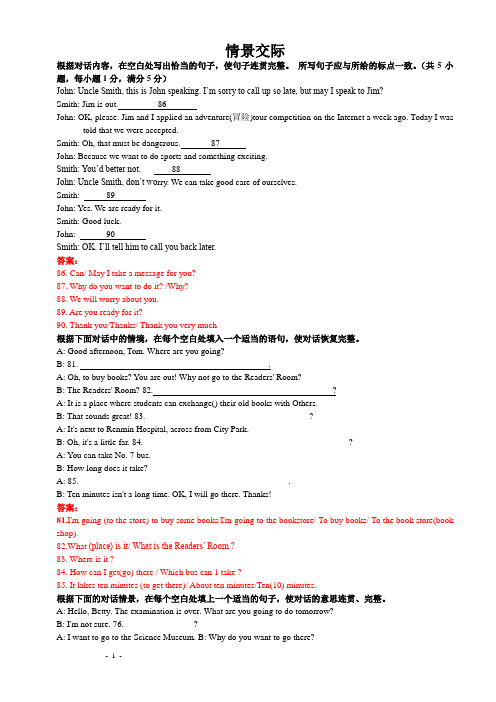
情景交际根据对话内容,在空白处写出恰当的句子,使句子连贯完整。
所写句子应与所给的标点一致。
(共5小题,每小题1分,满分5分)John: Uncle Smith, this is John speaking. I’m sorry to call up so late, but may I speak to Jim?Smith: Jim is out. 86John: OK, please. Jim and I applied an adventure(冒险)tour competition on the Internet a week ago. Today I was told that we were accepted.Smith: Oh, that must be dangerous. 87John: Because we want to do sports and something exciting.Smith: You’d better not. 88John: Uncle Smith, don’t wo rry. We can take good care of ourselves.Smith: 89John: Yes. We are ready for it.Smith: Good luck.John: 90Smith: OK. I’ll tell him to call you back later.答案:86. Can/ May I take a message for you?87. Why do you want to do it? /Why?88. We will worry about you.89. Are you ready for it?90. Thank you/Thanks/ Thank you very much根据下面对话中的情境,在每个空白处填入一个适当的语句,使对话恢复完整。
情景对话模拟试题及答案

情景对话模拟试题及答案一、情景对话理解题阅读以下情景对话,回答问题。
情景一:A: 你今天感觉怎么样?B: 我有点头疼,可能是昨晚没睡好。
A: 那你应该休息一下。
要不要我帮你请假?B: 好的,谢谢你。
问题1:B为什么头疼?答案1:B头疼可能是因为昨晚没睡好。
问题2:A给B提供了什么帮助?答案2:A提供了帮B请假的帮助。
情景二:A: 你周末有什么计划吗?B: 我打算去图书馆借几本书。
A: 听起来不错。
我也正想借一些书来读。
B: 那我们可以一起去,顺便讨论一下书的内容。
问题3:B的周末计划是什么?答案3:B的周末计划是去图书馆借几本书。
问题4:A对B的计划有何反应?答案4:A觉得B的计划不错,并且表示也想借一些书来读。
二、情景对话填空题根据情景对话,完成下列填空。
情景一:A: 你最近在忙什么?B: 我_________。
A: 听起来挺有趣的。
你_________?B: 是的,我_________。
答案:B: 我正在准备一个演讲。
A: 听起来挺有趣的。
你什么时候演讲?B: 是的,我下周五演讲。
情景二:A: 你_________?B: 我_________。
A: 你_________?B: 我_________。
答案:A: 你去过长城吗?B: 我去过,非常壮观。
A: 你最喜欢那里的什么?B: 我最喜欢那里的历史感。
三、情景对话改错题阅读以下情景对话,找出并改正错误。
情景一:A: 你明天有空吗?我们一起去看电影吧。
B: 好的,听起来不错。
但是,我明天有课。
A: 那我们后天去吧。
B: 后天我有空,我们一起去。
错误1:B的回答中“但是”后面应该使用“不过”。
改正1:B: 好的,听起来不错。
不过,我明天有课。
错误2:A的建议中“那我们后天去吧”缺少了礼貌的询问。
改正2:A: 那我们后天去吧,你觉得怎么样?情景二:A: 你最近在学习什么?B: 我在学习法语。
A: 你学了多久了?B: 我学了三个月了。
错误1:B的回答中“三个月了”应该使用完成时态。
中考英语补全对话(完成对话、对话填空)练习(含答案)
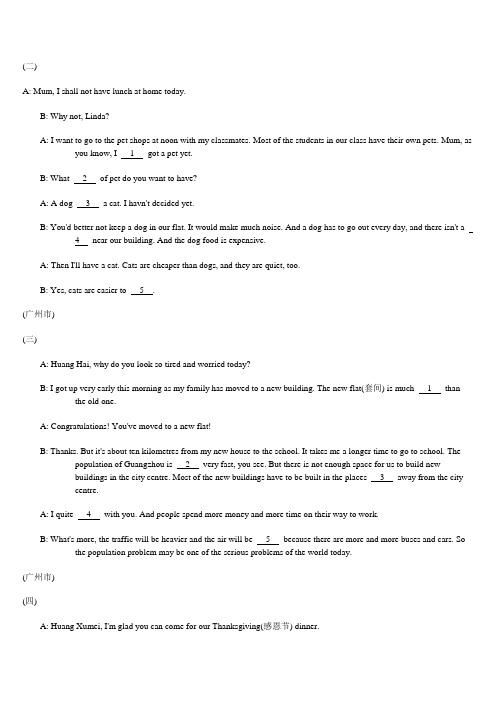
(二)A: Mum, I shall not have lunch at home today.B: Why not, Linda?A: I want to go to the pet shops at noon with my classmates. Most of the students in our class have their own pets. Mum, as you know, I 1got a pet yet.B: What 2of pet do you want to have?A: A dog 3 a cat. I havn't decided yet.B: You'd better not keep a dog in our flat. It would make much noise. And a dog has to go out every day, and there isn't a 4near our building. And the dog food is expensive.A: Then I'll have a cat. Cats are cheaper than dogs, and they are quiet, too.B: Yes, cats are easier to 5.(广州市)(三)A: Huang Hai, why do you look so tired and worried today?B: I got up very early this morning as my family has moved to a new building. The new flat(套间) is much 1than the old one.A: Congratulations! You've moved to a new flat!B: Thanks. But it's about ten kilometres from my new house to the school. It takes me a longer time to go to school. The population of Guangzhou is 2very fast, you see. But there is not enough space for us to build newbuildings in the city centre. Most of the new buildings have to be built in the places 3away from the citycentre.A: I quite 4with you. And people spend more money and more time on their way to work.B: What's more, the traffic will be heavier and the air will be 5because there are more and more buses and cars. So the population problem may be one of the serious problems of the world today.(广州市)(四)A: Huang Xumei, I'm glad you can come for our Thanksgiving(感恩节) dinner.B: Thanks for 1me, Jack. Why do you call it dinner when we are eating at noon?A: Because it's a big 2. We call it dinner when we have a lot to eat.B: Is that a chicken? It's so big!A: No, it's a turkey(火鸡). It's 3bigger than a chicken.B: Why do Americans and Canadians celebrate(庆祝) Thanksgiving?A: It's 4your Mid-autumn Festival. In China, families get together and enjoy looking at the bright, round 5. In America and Canada, families get together to celebrate the harvest(收获).B: So we each have an autumn festival. Something is the same in China, America and Canada.(广州市)(五)A: 1do you live in the USA?B: Let me show you on the map. I live in a 2called Gum Tree. 3you see Gum Tree? It's only a small village.A: Gum Tree? Is it here-near the town 4Ashland?B: Yes. Ashland is a small town about eight kilometers from the city of Richmond. What 5you? Where do you live?A: I live in a tall building in the city of Beijing.(湖州市)(六)Ann: Hi, Chen Hui!Chen: Hi, Ann! Thank you 1supper last night. I enjoyed it very much.Ann: It was a pleasure.Chen: I told my parents about last night. They asked me to thank 2mother. We hope you can come to our house for supper 3Saturday.Ann: That'll 4fine. I'll tell Mum and I think I am free that night.Chen: Good. Please give 5 a ring after you talk to your parents.Ann: Sure.Chen: Goodbye.Ann: Bye.(湖州市)(七)Xiao Ling: What time will the party start, Mum?Mrs Wang: Jane said 5:00 p.m.Mr Wang: It's half past four now. 1up. We should arrive in time.Mrs Wang: We must go at once and arrive 5-10 minutes early.Xiao Ling: I'm 2you are both wrong.Mr and Mrs Wang: Then what's your idea?Xiao ling: I think we'd better arrive 5-10 minutes 3.Mr and Mrs Wang: Why?Xiao Ling: In America, when a family hold a party, all of them must be 4getting ready for the party. If they have finished the work, they still need time to get themselves ready to receive their friends. So if we arrive early, itmay give them a lot of 5.Mr and Mrs Wang: That's quite right.(绍兴市)(八)A: Hi, Wang Li! Have you 1today's Zhenzhou Evening Paper?B: Not 2. What does it 3?A: It says a pupil was riding to school when a car 4him.B: Oh, dear! Things 5this often happen in busy streets. 6did the driver do with the pupil?A: He took him to a 7quickly. The boy was saved by the doctors.B: How is the boy now?A: He is getting much 8. But he has to 9in bed for a few days.B: We must be careful 10we go to school.(河南省)(九)A: Excuse me, 1you from Australia?B: Yes, 2how do you know?A: The 3you speak. When 4you come to China?B: This time 5year.A: So you have been in China for about a year.B: Yes, you are right.A: What do you 6of China?B: It's great. I like it very much.A: What do you like about China?B: The people, the food and the 7of interest.A: Have you ever been to the Great Wall?B: No, I haven't. I am going there next month. 8the way, can you tell 9how to get to the park?A: Certainly. Take the No.18 bus. It'll take you right there.B: Thanks a 10.A: That's OK.(神州市)(十)(Xiao Bin and his father are at home.)Xiao Bin: 1are you doing now, Dad?Father: I'm learning 23TV.Xiao Bin: What are you doing that 4. 5are only a taxi-driver, 6 a student. Is 7useful for you to learn English?Father: Yes. As we know, the Qlympic Games 8be held in 9in 2008. When that day 10, if I know much English, I will 11my taxi to give welcomes and 12to friends from all 13the world.Xiao Bin: Oh, you are really great!Father: And what's more, we have been a member of the WTO. So English will be more and more important from now on.Let's 14our best to 15English well.Xiao Bin: Good idea!(陕西省)(十一)A: Hello! 7123689.B: Hello! 1in Lin Tao. Could you tell me if 2is a history museum in your city?A: Yes, 3course. There are many old things on 4in it.B: When does it 5to the public(公众)?A: Every day except weekends from 9: 00 a.m. 65:00 p.m.B: I'd like to have a look. Can you make arrangements(安排) for a 7to the history museum, then?A: Yes, sure. Tomorrow is Tuesday. Are you 8tomorrow morning?B: Yes, how 9is it from here?A: It's about half an hour 10taxi(出租车).B: Well, I'll wait for you at the hotel gaet, then.A: OK, see you tomorrow at eight.B: See you.(山西省)(十二)Tom: Hi, Jim. I'm going to the 1to send a letter to my father.Jim: 2, too. And I also want to buy some stamps 3my sister. Let's go together.Tom: Jim, what are you going to do tomorrow?Jim: Nothing much. Why?Tom: My friends and I are going to Monkey Island to 4 a picnic. Would you like to join us?Jim: To Monkey Island? That's great. I've never been there 5. I think it will be very interesting. When shall we start and 6shall we meet?Tom: Let's start 7eight o'clock in the morning outside the school gate.Jim: I'm 8it's too late. Shall we make it a little 9?Tom: Well, what about a 10to eight?Jim: All right. See you tomorrow.Tom: See you.(广西自治区)(十三)A: Li Lei, how will 1spend your next Sunday?B: I'll just stay at home and 2watching TV.A: What kind 3TV programme do you like?B: Sports. I'm glad that the 17th World Cup is being held(正在举行) this month.A: I know you're a football fan. 4the way, how 5is the World Cup held?B: It's held every four years in different cities of the 6.A: Is it just like the Olympic Games(奥运会)?B: 7, it is.A: Oh, I see. But I still have another question, will China 8able to hold the World Cup in the future?B: I'm 9it will.A: That's great! I hope that day 10come soon.(柳州市)(十四)(Li Ming is talking about sports with Bill Jackson.)L: Of all sports, 1do you like best, Bill?B: Tennis is my favourite sport.L: I am not interested in tennis. I like table tennis, 2.B: I think table tennis is too soft a game.L: But it's one of the fastest moving games and most Chinese like it. Which is the most popular game in England?B: Most English people 3to like football. I like football, too, but…L: But not so 4as tennis.B: Right. By the 5, did you watch the football match on TV this morning, Li Ming?L: No, which teams were they?B: It was England against France.L: Which team 6?B: The English team.L: England is one of the best teams in the world.B: 7is the French team. It's a pity that they 8this time.L: But they won the World Cup in 1998. No one can 9win.B: Yes, I 10with you.(宜昌市)(十五)Woman: Policeman! Policeman!Policeman: 1?Woman: Somebody 2my handbag! My money, my credit cards(信用卡)-everything's gone!Policeman: All right. Don't 3! OK, now, what did the person 4like?Woman: He was tall and thin.Policeman: About how 5was he?Woman: About 1.8 metres.Policeman: 1.8 metres. And how heavy was he?Woman: Oh, I'm not very 6. Maybe about 80 kilograms.Policeman: And about how old was he?Woman: Oh, he was very 7-sixteen or seventeen, I think.Policeman: And what 8was his hair?Woman: Black, and it was long and straight.Policeman: 9about his eyes?Woman: I don't know. It all happened so fast.Policeman: Yes, of course. What was he 10?Woman: A T-shirt.Policeman: Fine, and now say something 11your handbag. What was it like?Woman: Well, it was small and dark brown.Policeman: What was it 12of?Woman: Leather(皮革).Policeman: OK. Now, I'll need your name and address.(扬州市)(十六)A: Hi, Lily! You don't look 1.What's the 2?B: I have 3 a headache and a fever(发烧).A: How long have you been 4this?B: 5since the day before yesterday.A: Have you 6your temperature?B: Yes, it's 38.5℃.A: Have you 7to the hospital yet?B: Yes, I have.A: What did the doctor 8?B: The doctor said I have got a cold.A: Is it 9?B: No. The doctor has given me some medicine.A: The best 10is to drink 11of water and get 12sleep.B: I will. Thank you.(泰州市)(十七)A: Hello, may I 1to Mary?B: Yes, this is Mary here.A: My family are going to Beijing druing the summer holidays. We're going to visit some 2of interest.B: Have you ever been there before?A: No, it's the first time 3us.B: That'll 4very interesting.A: What 5you?B: Maybe my parents will 6me to a few cities in the south.A: 7cities are you going to visit?B: Perhaps Shanghai, Nanjing, Wuxi and Hangzhou.A: Great! I'm sure you'll 8 a wonderful time.B: I hope 9, and I'm sure you'll enjoy 10there, too.A: Thank you. Bye-bye!B: Bye!答案:(二)1.haven't 2.kind/sort 3.or 4.park/garden/playgroun/field 5.keep/raise(三)rger/bigger/better/nicer 2.growing 3.far 4.agree 5.dirtier/worse(四)1.asking/inviting 2.meal 3.much/far/even 4.like 5.moon(五)1.Where 2.place/village 3.Can 4.of/called 5.about(六)1.for 2.your 3.on/next/this 4.be 5.me/us(七)1.Hurry 2.afraid te 4.busy 5.trouble(八)1.read 2.yet 3.say 4.hit 5.like 6.What 7.hospital 8.better 9.stay 10.When(九)1.are 2.but 3.way 4.did st 6.think 7.places 8.By 9.me 10.lot(十)1.What 2.English 3.on 4.for 5.You 6.not 7.it 8.will 9.Beijing es 11.drive 12.help 13.over 14.try/do15.learn/study(十一)1.This 2.there 3.of 4.show 5.open 6.to 7.visit 8.free 9.far 10.by(十二)1.post-office 2.Me 3.for 4.have(take) 5.before 6.where 7.at 8.afraid 9.earlier 10.quarter(十三)1.you 2.enjoy 3.of 4.By 5.often 6.world 7.Yes 8.be 9.sure 10.will(十四)1.which 2.instead 3.seem 4.much 5.way 6.won 7.So 8.lost/failed 9.always 10.agree(十五)1.Yes 2.took 3.worry 4.look 5.tall 6.sure 7.young 8.colour/color 9.What/How 10. wearing/in 11.about 12.made(十六)1.well 2.problem/matter/trouble 3.got 4.like 5.Ever 6.taken 7.been 8.say 9.serious 10.way 11.lots12.much/more/enough(十七)1.speak 2.places 3.for 4.be 5.about 6.take 7.What 8.have 9.so 10.yourself /yourselves。
五年级英语情景对话理解完形填空题60题(带答案)

五年级英语情景对话理解完形填空题60题(带答案)1There is a beautiful park near my house. In the park, there are many flowers and trees. The flowers are very colorful. There are red flowers, yellow flowers and pink flowers. The trees are very tall and green. There are also some benches in the park. People can sit on the benches and enjoy the beautiful scenery.1. The park is ___ (near/next/close/around) my house.答案:near。
“near”表示在……附近;“next”通常与“to”搭配,表示紧挨着;“close”也有靠近的意思,但后面一般要跟介词“to”;“around”表示在……周围。
这里表示公园在我家附近,所以用“near”。
2. The flowers are ___ (color/colorful/colored/colors).答案:colorful。
“color”是名词,颜色;“colorful”是形容词,多彩的;“colored”通常表示有颜色的;“colors”是名词复数形式。
这里形容花很鲜艳,要用形容词“colorful”。
3. The trees are ___ (tall/high/long/short).答案:tall。
“tall”通常形容人、树等有生命的物体高;“high”一般形容山、建筑物等无生命的物体高;“long”表示长;“short”表示短。
这里形容树很高,用“tall”。
4. There are some benches ___ (on/in/at/under) the park.答案:in。
四年级英语情景对话完形填空题40题
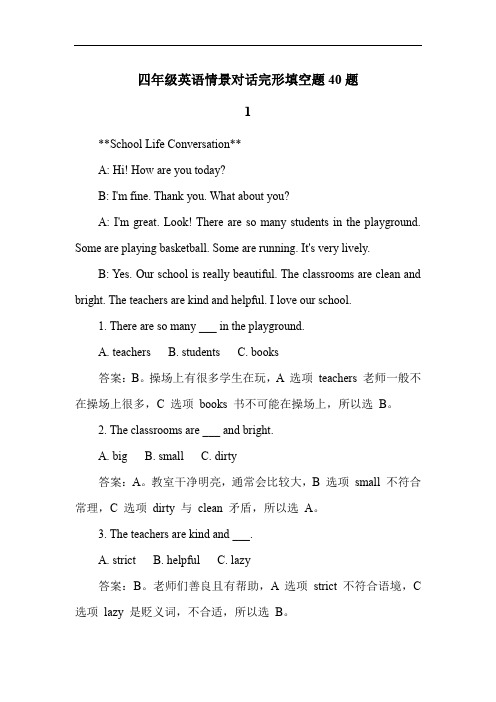
四年级英语情景对话完形填空题40题1**School Life Conversation**A: Hi! How are you today?B: I'm fine. Thank you. What about you?A: I'm great. Look! There are so many students in the playground. Some are playing basketball. Some are running. It's very lively.B: Yes. Our school is really beautiful. The classrooms are clean and bright. The teachers are kind and helpful. I love our school.1. There are so many ___ in the playground.A. teachersB. studentsC. books答案:B。
操场上有很多学生在玩,A 选项teachers 老师一般不在操场上很多,C 选项books 书不可能在操场上,所以选B。
2. The classrooms are ___ and bright.A. bigB. smallC. dirty答案:A。
教室干净明亮,通常会比较大,B 选项small 不符合常理,C 选项dirty 与clean 矛盾,所以选A。
3. The teachers are kind and ___.A. strictB. helpfulC. lazy答案:B。
老师们善良且有帮助,A 选项strict 不符合语境,C 选项lazy 是贬义词,不合适,所以选B。
4. I love our ___.A. homeB. schoolC. park答案:B。
前文一直在说学校,所以选B。
初二英语对话试题及答案

初二英语对话试题及答案一、对话理解(共20分,每题4分)1. 根据对话内容,选择正确的答案。
- A: What did you do last weekend?B: I went to the library and read some books. C: I watched a movie at home.D: I played basketball with my friends.- 答案:D2. 根据对话内容,选择正确的答案。
- A: How was your trip to the museum?B: It was great! I learned a lot about history. C: I didn't enjoy it very much.D: I didn't go to the museum.- 答案:B3. 根据对话内容,选择正确的答案。
- A: Did you finish your homework?B: Yes, I did. I finished it last night.C: No, I haven't finished it yet.D: I don't have any homework.- 答案:C4. 根据对话内容,选择正确的答案。
- A: What time did you get up this morning?B: At 6:30.C: At 7:00.D: At 7:30.- 答案:B5. 根据对话内容,选择正确的答案。
- A: Are you going to the concert tonight?B: Yes, I am. I'm really excited about it.C: No, I'm not. I have to study for a test.D: I don't know yet.- 答案:C二、对话填空(共30分,每空3分)6. A: ________ you ________ (do) your homework last night?B: Yes, I ________ (do) it.答案:Did, do; did7. A: ________ you ________ (go) to the park yesterday?B: No, I ________. I ________ (stay) at home and ________ (watch) TV.答案:Did, go; didn't; stayed; watched8. A: What ________ she ________ (do) after school?B: She ________ (go) to the supermarket to buy some food.答案:did, do; went9. A: ________ they ________ (like) this movie?B: Yes, they ________ (like) it very much.答案:Do, like; do10. A: ________ you ________ (have) lunch yet?B: No, I ________. I'm going to have it at 12:00.答案:Have, have; haven't三、对话改错(共20分,每题4分)11. A: Did you went to the party last night?B: No, I didn't.错误:went正确:go12. A: What did she do after she finished her homework?B: She went to bed.错误:did正确:does13. A: Have you seen the new movie?B: Yes, I have.错误:seen正确:see14. A: Are you going to visit your grandparents this weekend? B: Yes, I am.错误:Are正确:Do15. A: Did you enjoy the concert?B: Yes, I did.错误:无四、对话翻译(共30分,每题6分)16. A: 你昨天去图书馆了吗?B: 是的,我去了。
英语对话试题及答案
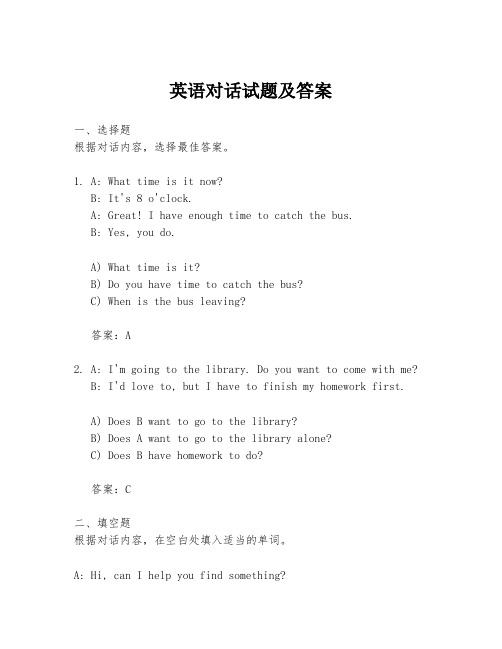
英语对话试题及答案一、选择题根据对话内容,选择最佳答案。
1. A: What time is it now?B: It's 8 o'clock.A: Great! I have enough time to catch the bus.B: Yes, you do.A) What time is it?B) Do you have time to catch the bus?C) When is the bus leaving?答案:A2. A: I'm going to the library. Do you want to come with me? B: I'd love to, but I have to finish my homework first.A) Does B want to go to the library?B) Does A want to go to the library alone?C) Does B have homework to do?答案:C二、填空题根据对话内容,在空白处填入适当的单词。
A: Hi, can I help you find something?B: Yes, I'm looking for a book on _______.A: What's the title?B: It's "The Great Gatsby."A) historyB) scienceC) literature答案:CA: Are you going to the party tonight?B: I'm not sure. I have to _______ my project first.A) finishB) startC) postpone答案:A三、翻译题将下列句子从英语翻译成中文。
新概念英语青少版1b练习册答案
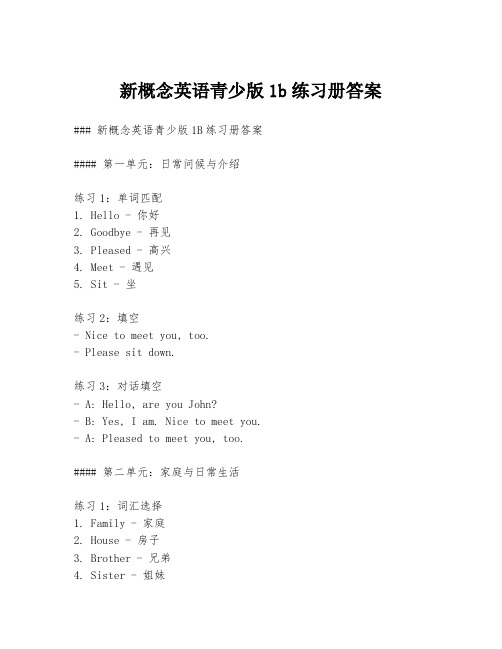
新概念英语青少版1b练习册答案### 新概念英语青少版1B练习册答案#### 第一单元:日常问候与介绍练习1:单词匹配1. Hello - 你好2. Goodbye - 再见3. Pleased - 高兴4. Meet - 遇见5. Sit - 坐练习2:填空- Nice to meet you, too.- Please sit down.练习3:对话填空- A: Hello, are you John?- B: Yes, I am. Nice to meet you.- A: Pleased to meet you, too.#### 第二单元:家庭与日常生活练习1:词汇选择1. Family - 家庭2. House - 房子3. Brother - 兄弟4. Sister - 姐妹5. Mother - 母亲练习2:句子构建- This is my family.- My brother is reading a book.练习3:对话练习- A: Who is that girl?- B: That's my sister.#### 第三单元:学校生活练习1:词汇连线1. School - 学校2. Teacher - 老师3. Student - 学生4. Classroom - 教室5. Homework - 作业练习2:选择题- Q: What does the student do after school? - A: He does his homework.练习3:对话完成- A: Where do you go every day?- B: I go to school.#### 第四单元:食物与饮食练习1:词汇匹配1. Apple - 苹果2. Banana - 香蕉3. Milk - 牛奶4. Bread - 面包5. Cheese - 奶酪练习2:填空- I like bananas and apples.练习3:对话填空- A: Would you like some milk? - B: Yes, please.#### 第五单元:颜色与衣物练习1:颜色匹配1. Red - 红色2. Blue - 蓝色3. Green - 绿色4. Yellow - 黄色5. Black - 黑色练习2:选择正确的颜色- The sky is blue.练习3:对话练习- A: What color is your shirt? - B: It's red.#### 第六单元:动物与宠物练习1:动物词汇1. Dog - 狗2. Cat - 猫3. Bird - 鸟4. Fish - 鱼5. Rabbit - 兔子练习2:填空- The cat is on the sofa.练习3:对话填空- A: Do you have a pet?- B: Yes, I have a dog.#### 第七单元:天气与季节练习1:天气词汇1. Sunny - 晴朗的2. Rainy - 下雨的3. Snowy - 下雪的4. Windy - 有风的5. Cloudy - 多云的练习2:选择正确的天气描述- Today is a sunny day.练习3:对话练习- A: What's the weather like? - B: It's rainy.#### 第八单元:旅行与地点练习1:地点词汇1. Park - 公园2. Zoo - 动物园3. Museum - 博物馆4. Beach - 海滩5. Mountain - 山练习2:填空- Let's go to the zoo.练习3:对话填空- A: Where do you want to go on vacation?- B: I want to go to the beach.请注意,以上内容仅为示例,实际的练习册答案可能会有所不同。
- 1、下载文档前请自行甄别文档内容的完整性,平台不提供额外的编辑、内容补充、找答案等附加服务。
- 2、"仅部分预览"的文档,不可在线预览部分如存在完整性等问题,可反馈申请退款(可完整预览的文档不适用该条件!)。
- 3、如文档侵犯您的权益,请联系客服反馈,我们会尽快为您处理(人工客服工作时间:9:00-18:30)。
原创2009年江西高考新题型———对话填空题Passage 1W: Good morning, sir.M: Good morning .Did you have a good time in the h________ (1)? Are you glad to be back at school?W: Yes, I’m very glad to be back, and begin my lessons again. I want to i__________ 2) my English. How can I do it, sir?M: You must try to talk in English as m________ (3) as possible. Don’t s__________(4) say “yes “or “no “and then stop. You can’t learn to talk if you n__________(5) talk, can you?W: No. But s__________(6) I made mistakes…M: Don’t worry about mistakes. First of all, learn the new words by _________(7) . Learn the whole sentences, not just s_________ (8) words. A_________(9) thing, don’t be afraid to talk. Just try to say what you want to say, and don’t be afraid that people will laugh at you. The more you talk, the f___________(10) mistakes you will make.W: Well, thank you. I’ll do as you say.Passage 2W: Good afternoon .What can I do for you?M: Can you s_______ ( 1 ) me some ties?W: Certainly, sir. How about this new d______ ( 2 )?M: It doesn’t s_____ ( 3 ) me.W: And this one?M: Too d______( 4 ) for me.W: How do you like that one next to this?M: Please let me see that.W: This is a Swiss product and made of the finest m______( 5 ) . Please feel it. It’s very soft.M: Yes, it’s better and s______ ( 6 ) than that one. How much is it?W: Seven dollars and fifty cents, sir.M: Quiet e______ ( 7 ) , isn’t it?W: You must c________ ( 8 ) this quality, sir. That’s one of the best we have, and m______( 9 ) beautiful.M: All right. Wrap it up for me, please. Here is ten dollars bill.W: I’ll give you c_______( 10 ) right away.Passage 3:W: Good morning .M: Good morning .Can I help you ?M: Yes,are there any tickets l______( 1 ) for the Chinese Music Concert on the 28 th,please?W: Just a m______ ( 2 ) ,please.No, I think you’ve made a m_______( 3 ) .It’s on the 30 th.M:R_______ ( 4 ) ? I read it in the paper today.I’m sure it said Chinese Music Concert on the 28 th.W: Oh, sorry.I t______ ( 5 ) you said Japanese Music Concert.The Chinese Music Concert on the 30 th at 7:15,but I’m afraid there only b______ ( 6 ) seats left,and they are 30 yuan e_____ ( 7 ) . M: That’s OK.Can I have two ,please?W: How would you like to p_____ ( 8 ) for these?M: By c_____ ( 9 ) . Here you are .W: Thank you ,and here are your t_____( 10 ).M: Thank you very much.三、解题方法及备考策略A. 题目要求所给信息:(1)一定要根据对话设置情景并置身于情景之中把握适当的语境。
(2)寻找信息词即(key words)以获得主要信息即(main information) (3)所填之词要正确、完整。
B. 所考词性分析:动词3个、名词1个、形容词1个、副词1个、介词1个、代词1个、数词1个关系副词1个1.跳读对话, 整体理解对话跳过空格,快速把对话从头至尾读一遍,从整体上理解对话的大意,获取有关对话的内容、语境,及所使用的时态、语态等信息。
2.通读对话,试填单词抓住上下文内容联系和逻辑关系,根据命题人所给的首字母试填单词。
做题时要弄清空格处待填的词是什么词性,在句中作什么成分。
同时,要注意采用词的什么形式,如用动词,就要考虑动词的时态、语态、语气、非谓语动词形式,主谓一致等;如用名词,就要考虑名词的可数与不可数,名词的单数与复数;另外,学生还要注意习惯表达及口语的语体特点。
3.细读对话,从上下文寻找信息4.复读对话,调整答案检查所填单词是否能使文章上下连贯,前后照应,逻辑合理。
四、对话填空常考且易写错单词学生应掌握1200个常用单词和一定数量的习惯用语和固定搭配。
1.名词experience, equipment, progress, advantage, information, advice, news, advertisement, chance, guest, degree, university, condition, company, village, role, painting, pleasure, rent(租金)2.动词happen, connect, avoid, employ, insist, depend, graduate, invite, advertise, contact, start, change, rent, move, sign, recommend, sound, interest, grow(grew, grown), study(studied, studied), act, show, celebrate, mean,prefer, suppose3.形容词Possible, further, competitive, nervous, international, native, helpful, necessary, comfortable, uncomfortable, interesting, interested4.副词Unfortunately, unluckily, instead, quietly, actually, already, really一M: Mike J: JaneM: Hi, Jane. It’s nice to see you again. I ⑴h__________ that you went to the US during the ⑵v___________.J: Yes. I went to New York to ⑶a__________ a summer course in English.M: Wow. You were (4)l________. How long did you stay there?J: About fifty days. I went there on July 5 and came back on(5) A______ 25.M: Where did you stay in New York?J: Oh, I lived an American family, the Smiths. They are very kind people. Shortly after I arrived, we became good friends. And, (6) l_______ in their house, I could speak English every day. (7) B_________, I didn’t need to worry about my daily three meals.M: How nice! And how about the course?J: The course was also very good. The teachers were nice. They taught us to listen, speak, read and write in English, but it was mostly speaking. One interesting thing I found was that the American classes are (8)d_______ form our classes here because they are very free. You can sit ⑼a__________ you like in the classroom. And you are welcome to ⑽s________ your ideas with the class. I really liked this kind of class.M: How interesting! Maybe our teachers should try that.一. 1. heard 2. vacation 3.attend 4. August 6. living 7. Besides 8. different 9. anywhere 10. share二M: Can you tell me something about your education?W: Yes. I’m a (1) g of Zhengzhou University. I learned business.M: Did you (2) l your business courses?W: Very much, and I’ve done well in all of them. Here are the (3)r________ of my examinations. M: Hm, you were indeed a good student. What about your (4) s English?W: I can talk with foreigners (5)f______. When I was at college, I often went to the English Corner. We had English teachers from Australia.M: Hm. We can hire you. We give the employees a (6) s of 480 dollars a month at the beginning. If you do a good a job, you will get a rise in three months’ (7) t .W: That’s great. How long should I work every day?M: Four hours every day and two days off in a week.W: Do you (8) o housing to your employees?M: Not now. My assistant will tell you (9) w you are interested in.W: OK. When shall I (10)b______ my work?M: Next week.二. 1. graduate 2. like 3. results 4. spoken 5. freely 6. salary 7. time 8.offer 9. what 10.begin三M: Would you please tell me what you were doing when the accident happened and what you saw? W: Yes, I was (1)d________ home from work. It was about 5:15 ,and there was a blue car in front of me. We were both driving along Harbor Road (2)w________ a small white Ford suddenly shotout of the side road. It shot right in front of the blue car. The driver tried to stop, but it was impossible. He (3)r__________ into the white Ford.M: What’s the (4)s__________ of the car in front of you when the accident happened?W: The blue car? Thirty miles an hour. Certainly no more than that.M: And the white Ford shot out without any (5)w_____________?W: Yes, that's right.M: How can you make (6)s________ that the blue car was only doing thirty?W: Because I was only doing thirty, and the blue car wasn't going any (7)f________ than I was. M: Are you sure of that? Absolutely positive?W: Yes, I am. I'm positive.M: How can you be so positive? Were you (8)l________ at your speedmeter when the accident happened?W: Of course not. I was looking at the road ahead. That's how I (9)m_________ to see the accident. M: Well, if you were not looking at your speedmeter how can you possibly be sure how fast you were going?W: Because I never go faster than 30 on that road. It's (10)a___________ law.三. 1:driving,2 when,3 ran, 4 speed, 5.warning, 6.sure, 7.faster, 8. looking 9. managed,10.against四W: Now let’s go back to your f irst novel, Rag Doll. When did you write it?M: Rag Doll, yes. I wrote it in 1960, a year after I left (1)s__________.W: How old were you then?M: Um, eighteen? Yes, eighteen, because a year (2)l__________ I went to Indonesia.W: Mm. And of course it was your (3)e______________ in Indonesia that inspired your first film Eastern Moon.M: Yes, that’s right, although I didn’t actually (4)m_________ Eastern Moon until 1978.W: And you worked in television for a time too?M: Yes, I started making documentaries for television in 1973, when I was thirty. That was after I (5)g_________ up farming.W: Farming?M: Yes, that’s right. You see, I stayed in Indonesia for eight years. I met my wife there in 1965, and we came back and bought a (6)f_________ in the west of England, in 1970. A kind of experiment, really.W: But you gave up three years later.M: Well, yes. You see it was very hard work, and I was also very busy (7)w_________ on my second novel, the Cold Earth, which (8)c_________out in 1975.W: Yes, that was a (9)b__________, wasn’t it?M: Yes, it was, and that’s why only two years after that I was able to give up television work and fix my (10)a___________ on films and that sort of thing. And after that…四. 1. school, 2. later, 3. experience, 4. make, 5. gave, 6. farm, 7. working, 8. came, 9. best-seller, 10.attention。
